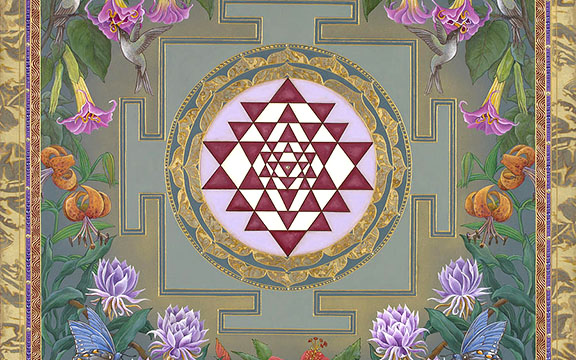
(Photo: Artistic rendering by Nadean OBrien of the Sri Yantra—5,000 year-old mystical symbol of the Divine Feminine in classical Tantric tradition.)
At a recent Earth Day event that was held at the Integral Yoga Institute in San Francisco, we honored Mother Earth with prayers, expressions of gratitude, and a puja, as we committed ourselves to restoring the earth. Many countries celebrate Mother’s Day in the month of May, so this is a wonderful time to reflect and keep our hearts focused on honoring the mother—both our mother figures and the energies, virtues and lessons of the Divine Feminine.
The Divine Feminine refers to the creative energies that bring Spirit into expression and all the manifestations of Spirit into form. Honoring it need not imply worshiping a Hindu goddess with six arms. Honoring the Divine in its feminine aspect can be as simple as appreciating the natural beauty around us and as practical as planting a backyard garden.
Working cooperatively with the earth in this way, caring for the soil, and sharing its abundance, is a beautiful way to honor Mother Earth and nourish each other. Likewise, we honor the earth by caring for our natural environment, recycling, preventing waste and pollution, and supporting green energy.
Spending time in nature can be deeply healing. Being in contact with the earth, such as walking barefoot or lying in the grass, grounds us, relieves tension and alleviates stress. We often talk about being in nature as if we are separate from it. Our bodies are a part of nature and caring for them—seeing them as temples of the Spirit within—is also a way of showing reverence. This doesn’t mean obsessing over the superficial look of the body, but nourishing it with proper food and rest, and respecting its needs with our posture and breathing.
Our female energies are essentially creative, giving birth to life and nourishing growth with caring and protection. This creative power exists in each of us and we give expression to it through art, music, and writing. But even starting a business, setting up a home, teaching a Yoga class, or cooking for friends gives expression to this potent energy. We honor these energies by giving ourselves time to be creative in whatever ways move us.
Yet another way of relating to the feminine aspect is the image of a Divine Mother. Many female saints and deities are role models of great virtue or a personification of spiritual qualities that inspire us to emulate them and seek their guidance. By acknowledging a spiritual presence beyond the ego-mind and its limited ideas, we humble ourselves and open our hearts to receive a grace that is always present. Praying this way, or invoking the Divine Mother through a ritual like puja, can be a powerful way to access an inner strength and rise above selfish thinking by feeling our connection to a Higher Power.
An obvious way of honoring the Divine Feminine is to honor our own mothers. Peoples around the world follow the tradition of celebrating Mother’s Day often by offering gifts of appreciation to their physical mothers, or anyone who has been a mother figure in their lives. Most of us have someone who has mothered us: feeding and protecting us, nourishing our development, supporting us through hard times, and loving us despite our mistakes. Acknowledging, with gratitude, all we have received opens our hearts and reminds us of the importance of the natural feminine propensity to nourish others.
Our modern culture places so much importance on science and technology, often with a world-view based primarily on ideas that can be tested with empirical observation. A sole emphasis on this world-view can cause us to feel separated from our natural interconnection with each other and the very creation we dwell in. It can also contribute to an imbalance that may be at the root of many of the problems we now face. Honoring the Divine Feminine can help us find balance and experience ourselves as part of the whole. This shift will enable us to see with a more global vision and may help solve the problems that torment a world torn from this holistic perspective.
About the Author:
 Swami Ramananda is the president of the Integral Yoga Institute of San Francisco and a greatly respected master teacher in the Integral Yoga tradition, who has been practicing Yoga for more than 35 years. He offers practical methods for integrating the timeless teachings and practices of Yoga into daily life. He leads beginner, intermediate, and advanced-level Yoga Teacher Training programs in San Francisco and a variety of programs in many locations in the United States, Europe, and South America. Swami Ramananda trains Yoga teachers to carry Yoga into corporate, hospital, and medical settings and has taught mind/body wellness programs in many places. He is a founding board member of the Yoga Alliance, a national registry that supports and promotes Yoga teachers as professionals.
Swami Ramananda is the president of the Integral Yoga Institute of San Francisco and a greatly respected master teacher in the Integral Yoga tradition, who has been practicing Yoga for more than 35 years. He offers practical methods for integrating the timeless teachings and practices of Yoga into daily life. He leads beginner, intermediate, and advanced-level Yoga Teacher Training programs in San Francisco and a variety of programs in many locations in the United States, Europe, and South America. Swami Ramananda trains Yoga teachers to carry Yoga into corporate, hospital, and medical settings and has taught mind/body wellness programs in many places. He is a founding board member of the Yoga Alliance, a national registry that supports and promotes Yoga teachers as professionals.


